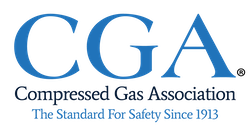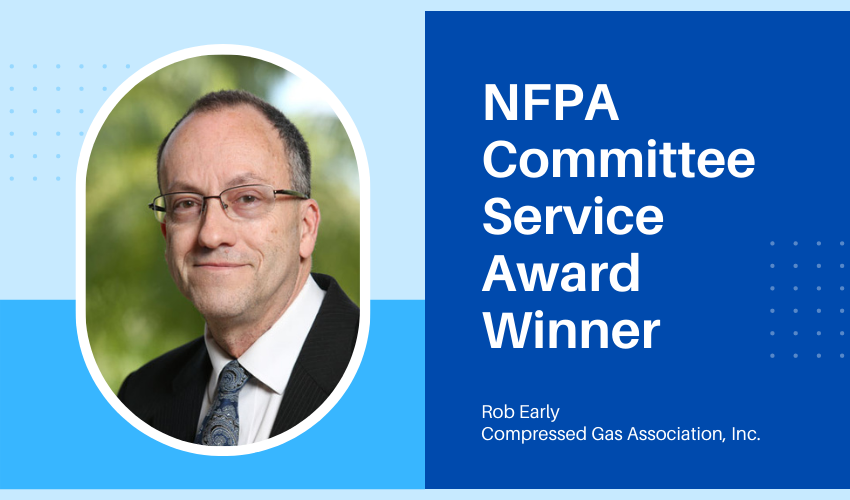There aren’t many people who would willingly take on tasks that produced more meetings. But Rob Early, CGA’s technical manager, does just that, serving on six committees and chairing one other with the National Fire Protection Association (NFPA).
“Some of the committees are at the very core of our business,” Early said. “Others are more tangential, but we have to pay attention to what’s going on and make sure that the committee doesn’t go outside of its scope.”
Early’s commitment to the NFPA work on behalf of CGA members has earned him one of NFPA’s highest awards, the Committee Service Award. The award is presented to a technical committee member who serves for a substantial period of time and provides distinguished service to NFPA in the development of NFPA codes and standards.
The award is a recognition of Early’s investment of “a lot of time and effort to providing input into the NFPA codes and standards,” said Rich Craig, CGA’s vice president, technical and regulatory affairs. “We view the relationship between NFPA and CGA as very important. We want to maintain that relationship in an open and collaborative manner and having Rob recognized for all his work is very gratifying.”
Early’s work with NFPA began before he joined CGA as a staff member, when he worked for a member company. CGA staff and members serve on a total of 16 NFPA committees, ranging from hydrogen technology to portable fire extinguishers.
“As technical committee members, industry experts volunteer their time to provide the knowledge needed to develop and revise our documents in an open, honest and collaborative way,” said Heath Dehn, a senior engineer with NFPA who has worked closely with Early. “It is important that committee members from organizations like CGA participate in this process, since they bring the views of many to a committee rather than one individual or company.”
The Importance of Involvement
It’s that voice of experience, of understanding what happens on the ground with gases, that makes CGA representatives such a vital participant at the table. NFPA codes and standards are used by communities throughout the United States to develop fire and building codes. Other countries often reference NFPA codes as well.
“Being involved in establishing those requirements is essential to ensuring that the requirements are both appropriate and effective,” Craig said. “Through Rob’s participation on these committees, as well as the participation of our members on many of them, we ensure that the industry’s perspective is recognized and incorporated into these codes and standards. That can either be through words we provide to them, or by providing references to our publications.”
NFPA codes are typically revised on a three- to five-year cycle, meaning work is constantly in motion. CGA members and staff are involved in committees of known importance and those that may be. “What we have found over the years is there may be committees that we didn’t recognize as being important to us that have surprised us,” Craig said. “We have subsequently looked to participate on those committees so that we are involved in the discussion and decision-making process.”
In general, by the time a code or standard is issued, CGA members are not surprised. The committee work has helped CGA to know what’s coming, Early said. Then, members can be informed well in advance.
The ultimate goal of NFPA codes and standards is “to help save lives and reduce loss with information, knowledge and passion,” Dehn said.
That is a mission that CGA wholeheartedly supports, Craig said. “Standards are history lessons, often written to address a bad event that happened and to prevent it from happening again,” Craig said. “We want to ensure that those lessons don’t get lost.”
Hydrogen is a prime example, with interest growing in its role as an alternative fuel. “People who are new to hydrogen may not understand the reason certain requirements are in place,” Craig said. “We want to ensure that people understand the reason for the standards, so that the incidents that we know how to prevent don’t happen again.”
Working Together on a Common Interest
One of the key roles that CGA plays with its members who serve on NFPA committees is ensuring that the industry speaks with one voice. That may mean navigating through competing company interests, Early said. “The goal is to make sure that we have aligned positions within the companies. What we don’t want is to have competing viewpoints between our members, or between a member and CGA, and have that discussion in public.”
CGA’s codes committee can vet those within CGA and “hopefully resolve the conflicts before we go public,” Craig said. “Sometimes that has been a little contentious internally, but we’ve not had a lot of public flareups. We will be forceful in representing what we think is the right technical solution, that the requirements are effective and appropriate, and will push back when we think they’re not, recognizing we don’t always get our way.”
Serving on the committees is often an added job for members, who “do it because they recognize the importance of involvement and they have an interest and expertise that they’re willing to share for general public safety,” Craig said.
Benefits can extend beyond the successful influence of a code or standard, though. “Committees can end up developing people in the industry,” Early said. “And those outside the industry can learn more about CGA and what we can bring to the table.”
And for Early, the many hours and years of service has led to this NFPA award, something he calls “humbling. There are a lot of good committee members, from CGA and others who are helpful and enthusiastic. “


